Key takeaways:
- Political accountability is essential for maintaining trust between elected officials and constituents, with active civic engagement being crucial for holding leaders accountable.
- The current political accountability landscape in South Africa shows progress but presents concerns regarding citizen skepticism and ongoing corruption scandals.
- High-profile cases, such as the Nkandla scandal and the “State Capture” inquiry, illustrate significant issues of accountability, highlighting the challenges faced in enforcing responsibility among leaders.
- Effective accountability fosters trust and encourages civic participation, while its absence can lead to disillusionment and apathy among citizens, especially the youth.
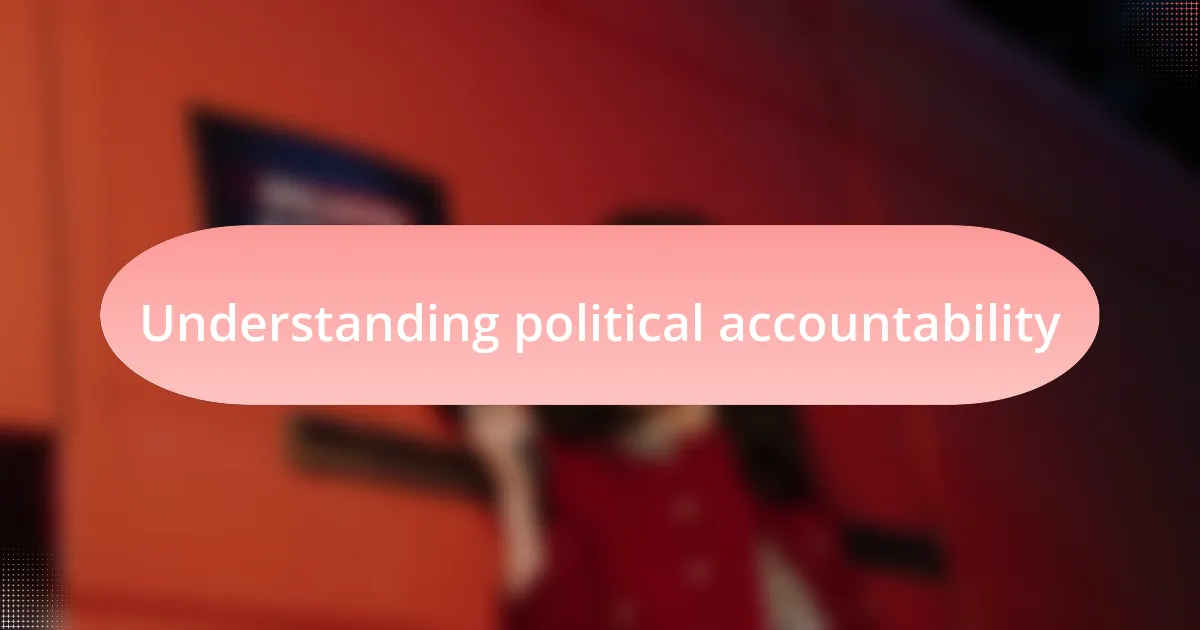
Understanding political accountability
Political accountability is fundamentally about the responsibility that elected officials have to their constituents. I often reflect on how, as voters, we place our trust in these individuals, expecting them to act in our best interests. Have you ever felt let down when a politician’s actions didn’t align with their promises? It’s a deeply frustrating experience that can lead to disenchantment with the political process.
In my view, the mechanisms of accountability, such as public reporting and oversight by independent bodies, are crucial. I remember attending a local council meeting where citizens held officials accountable for their decisions; it was empowering to see people voice their concerns directly. It made me realize that our engagement is vital in ensuring that leaders remain answerable for their actions.
Without accountability, the democratic system risks becoming a mere facade. I often wonder what would happen if citizens became apathetic. Would we continue to see a decline in public trust? These reflections remind me that an active and informed electorate is the backbone of true accountability in governance.
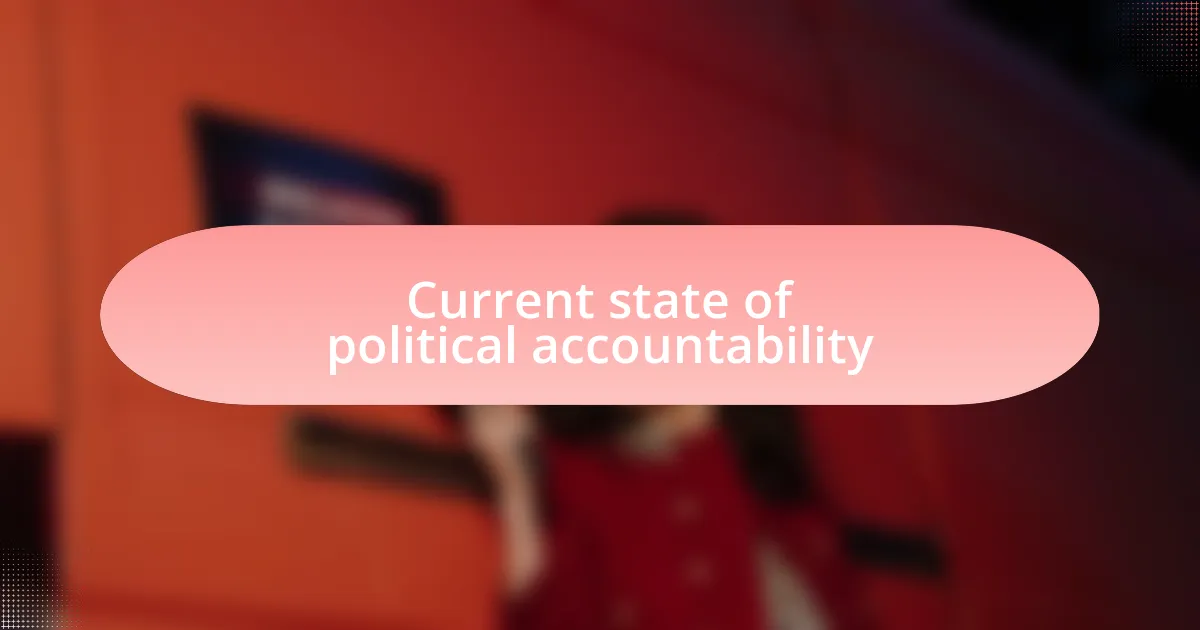
Current state of political accountability
The current state of political accountability in South Africa reflects a mixed landscape. On one hand, there have been strides toward legislative reforms aimed at reinforcing accountability mechanisms, particularly in response to public demand for transparency. However, I can’t help but notice a lingering sense of skepticism among citizens, wondering if these measures are truly effective in holding leaders accountable for their actions.
Just recently, I attended a community forum where citizens expressed frustrations about ongoing corruption scandals involving public officials. Their passion was palpable, revealing a heightened awareness that accountability should not just be a phrase tossed around by politicians. It left me questioning whether these measures are enough to restore faith in our political institutions.
Moreover, the role of civil society has become indispensable in advocating for political accountability. I’ve seen grassroots movements rise up, mobilizing people to demand answers and justice. This phenomenon is inspiring; the collective voices echo a persistent call for those in power to be held to account. Isn’t it encouraging to think that, despite the challenges, engaged citizens can drive change in the political landscape?
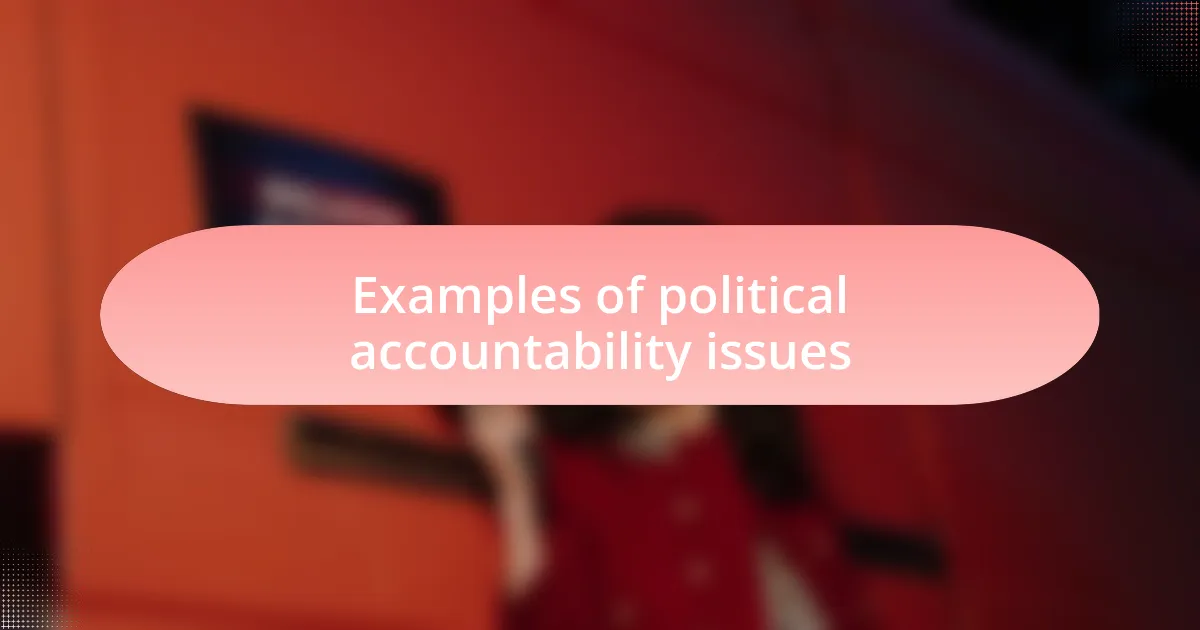
Examples of political accountability issues
Political accountability issues manifest in glaring instances where leaders evade responsibility. One notable example is the infamous case of the Nkandla scandal, where former President Jacob Zuma faced immense backlash for misusing state funds to upgrade his private residence. Sitting at home, I remember the frustration I felt as discussions unfolded about how politicians could sidestep accountability for such a blatant misuse of resources meant for public service.
Another vivid example is the controversy surrounding the “State Capture” inquiry, revealing corruption that reached the highest levels of government and private sectors. It was hard not to feel a tinge of disillusionment while watching hearings, realizing that promises of accountability often felt like empty words. How can we expect change when those supposed to uphold integrity are incriminated in the very systems they’re meant to oversee?
Furthermore, the insufficient response to whistleblower reports contributes to the erosion of trust. In my own encounters with local activism, I’ve met brave individuals who risk their livelihoods to expose wrongdoing, only to be met with silence or retribution. Isn’t it alarming that our society relies on courageous voices to shed light on issues that should be addressed openly and honestly? These examples underscore the importance of robust mechanisms to ensure political accountability and protect those who speak out.
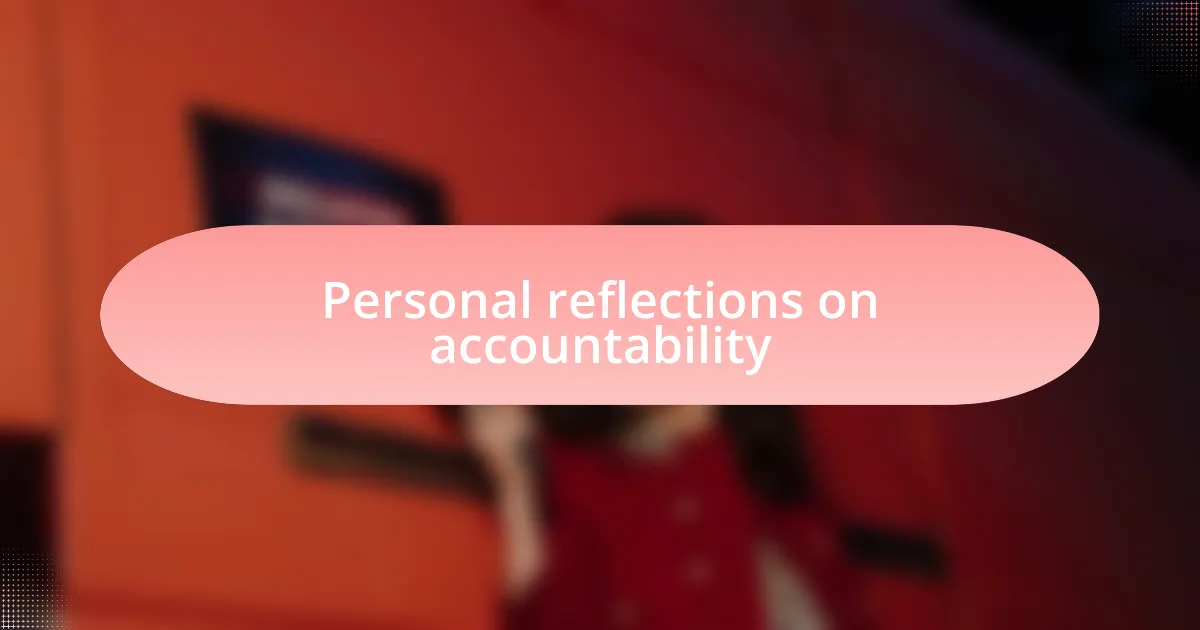
Personal reflections on accountability
When I reflect on accountability, I can’t help but think of the times I attended local council meetings. There, I watched as community leaders made bold promises, yet many of those words evaporated into thin air once the spotlight dimmed. It’s disappointing to realize that in places where we expect transparency, we often encounter evasion instead. How many times have we heard lofty statements about change, only to see the same patterns repeating?
I recall a conversation with a friend who works in the civil service. She shared her frustrations about the lack of consequences for officials who disregard ethical guidelines, painting a bleak picture of a landscape where responsibility is just a whispering voice drowned out by political noise. It made me wonder, what message are we sending to the next generation when those in charge escape accountability time and again?
Personal experiences have shown me the power of collective action in holding leaders accountable. I remember organizing a community protest against decisions that disregarded citizen input. The sense of unity and shared purpose was electric, but it also brought forth an unsettling realization: Why should we have to fight so hard for our voices to be heard? Accountability shouldn’t be a battle; it should be a foundational expectation in any democracy.
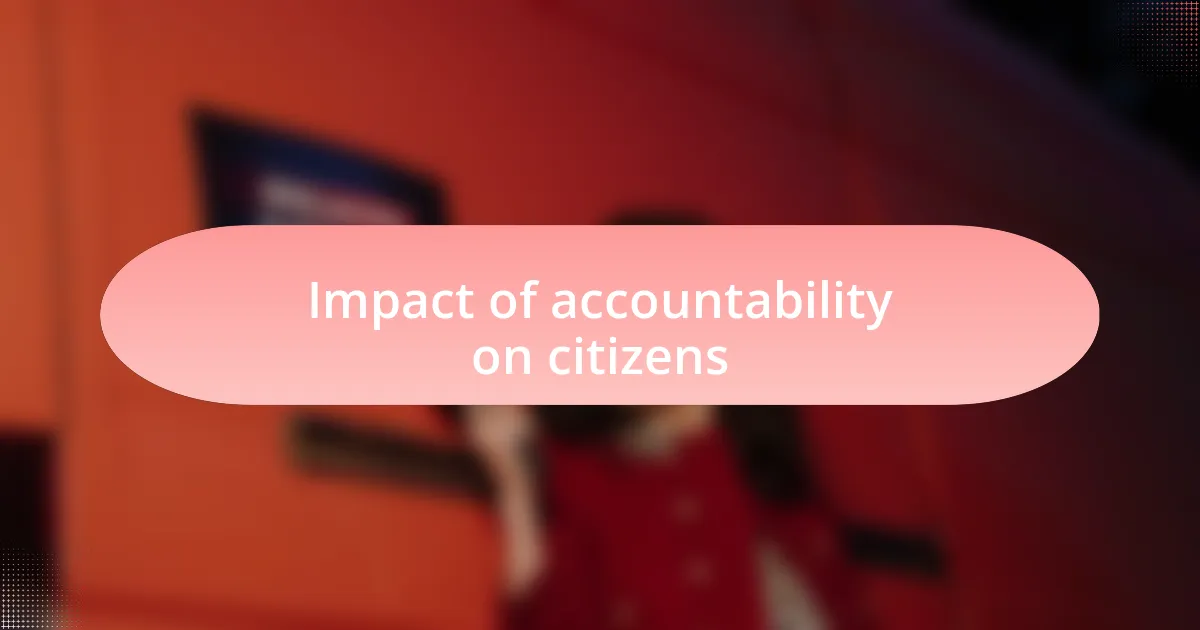
Impact of accountability on citizens
One of the most profound impacts of accountability on citizens is the fostered sense of trust in governmental institutions. I remember a local initiative to improve community safety, where the leaders were genuinely held accountable for their commitments. Seeing tangible changes—like improved street lighting and more visible community patrols—instilled a belief in the process. Isn’t it uplifting when actions align with words?
Conversely, the absence of accountability breeds cynicism among citizens. I recently met with a group of young activists who expressed their frustrations. They felt disillusioned, convinced that their voices were mere echoes in the vast chambers of bureaucracy. When leaders evade responsibility, it’s like throwing a wet blanket on citizens’ hopes. How can we expect young people to engage in democracy when they see no reflection of their concerns in the actions of those in power?
Lastly, accountability encourages active participation. During a town hall meeting I attended, the mere fact that officials were required to provide answers prompted many citizens to share their opinions. I noticed individuals who had once been silent now speaking up boldly, fueled by the idea that their thoughts could lead to real change. This transformation showcases that when people see their leaders held accountable, they feel empowered to take part in shaping their communities. How amazing is it to witness such a dynamic shift toward greater civic engagement?